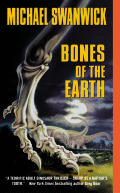
| Publisher: | HarperTorch |
| Copyright: | March 2002 |
| Printing: | March 2003 |
| ISBN: | 0-380-81289-4 |
| Format: | Mass market |
| Pages: | 383 |
This was the first of the books that I read because they were Hugo nominees for 2003, mostly because of having attended a panel about the Hugo awards this year at Baycon. Since it was a Hugo nominee, I had somewhat high expectations of it, but was also curious to see what sort of novel gets nominated for Hugos.
This is a time travel novel. There are really two different approaches one can take to a basic problem of time travel: you can construct some sort of artificial limitations to avoid or give the characters an incentive to avoid any sort of paradox (McCaffrey does this in her Pern novels), or you can embrace the paradoxes and play them for all they're worth. Back to the Future does the latter. So does Bones of the Earth.
The basic premise is that time travel has been discovered in the future and brought back into the past to a certain extent, but is available almost exclusively to paleontologists. There are outposts throughout history for direct observation of dinosaurs, and the best scientists are recruited from time periods even before time travel was widely known. The main character is one such recruit, and gets drawn into both investigation through time and the politics of time travel.
The story opens extremely quickly, and about the first half of the book is a dizzying parade through entwined eras and a cast that folds back on itself in interesting ways. I enjoyed the pacing quite a lot, even though I never developed much attachment to any of the characters. Things kept moving and stayed interesting. Halfway through the book, though, the pacing slows down very abruptly, and my enjoyment dropped off with it. In the end, this book suffered from what I think is a common failing of time travel novels, namely a mostly unsuccessful struggle for a satisfying ending. While there are various reasons for that in this book, I think some of it comes down to the fundamental problem that it's hard to actually conclude something when the characters can just hop past any traditional ending of the book.
There's quite a bit of dinosaur geeking in this book, with what appears to be quite a lot of research behind it, and some of that is very interesting. It also seems largely ancillary to the story, even though it's the focus of all of the main characters. I found the science interesting, and I found the underlying mystery of what's going on politically and socially interesting, but the two of them were never really tied well together into a solid story. Even at the end of the book, the linkage is... well, poor.
In fact, the ending, and in general the last half of the book, are really the problem with it. It feels like Swanwick ended up writing himself into a corner and then couldn't find a good way to get out of it again. He salvages the ending somewhat, but it still left me with a vaguely unsatisfying feeling of "so, what was the point?"
Because of that, combined with the lack of particularly interesting characters, I can't really recommend this novel, and I certainly wouldn't have nominated it for a Hugo. On the other hand, it was an enjoyable read, and I've learned interesting things about dinosaurs that I didn't know before. I don't regret reading it.
Reviewed: 2003-08-23